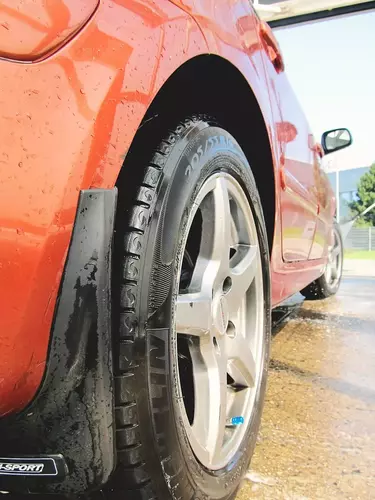
When it comes to maximizing the fuel economy in your Ford vehicle equipped with a 3.0L engine, a few simple tips and practices can go a long way. By adopting efficient driving habits and implementing regular maintenance routines, you can optimize your fuel efficiency, save money at the pump, and reduce your environmental impact. In this blog, we’ll share valuable tips to help you get the most out of your Ford 3.0L engine while minimizing fuel consumption.
Related Article: Exploring the Engineering Behind the Ford 3.5L Engine
Tips to Maximize Fuel Economy
One of the easiest and most effective ways to improve fuel economy is to ensure your tires are properly inflated. Underinflated tires create more rolling resistance, resulting in decreased fuel efficiency. Regularly check the tire pressure using a reliable gauge and inflate them to the recommended levels specified in your vehicle’s manual.
Drive Smoothly and Avoid Rapid Acceleration:
Aggressive driving habits, such as rapid acceleration and abrupt braking, can significantly impact fuel economy. Instead, practice smooth acceleration and deceleration, allowing the engine to operate efficiently and minimize fuel consumption. Maintain a steady speed whenever possible, utilizing cruise control on highways to optimize fuel efficiency.

Reduce Excessive Idling:
Idling wastes fuel and contributes to unnecessary emissions. Avoid prolonged idling by turning off the engine when you anticipate an extended stop, such as waiting at a railway crossing or picking up a passenger. However, keep in mind that restarting the engine consumes a small amount of fuel, so use discretion based on the duration of the anticipated stop.

Plan Efficient Routes:
Planning your trips and routes in advance can help minimize unnecessary driving and save fuel economy. Combine multiple errands into a single trip, consider traffic conditions, and utilize navigation systems or smartphone apps to find the most efficient routes that avoid congestion and traffic jams.
Carrying unnecessary weight in your vehicle can decrease fuel economy. Regularly remove any items, such as sports equipment or tools, that you don’t need for your current trip. The lighter your vehicle, the less fuel it will consume, so keep your Ford 3.0L engine optimized for efficiency.

Use the Right Grade of Motor Oil For better Fuel Economy:
Choosing the correct grade of motor oil for your Ford 3.0L engine can enhance its efficiency. Consult your vehicle’s manual for the recommended oil viscosity and quality standards. Using high-quality, low-friction synthetic oils can improve fuel economy by reducing internal engine friction.
Maintaining your Ford 3.0L engine according to the manufacturer’s recommendations is essential for optimal fuel economy. Regularly change the engine air filter, fuel filter, and spark plugs as per the recommended intervals. A well-maintained engine runs more efficiently and consumes less fuel, improving fuel economy.
Reducing aerodynamic drag can positively impact fuel economy. Remove unnecessary roof racks, cargo carriers, or any other external accessories that can create wind resistance. Keeping windows closed at high speeds also minimizes drag, leading to improved fuel efficiency.
By implementing these practices, you can increase your gas mileage and save money at the pump while reducing your environmental impact
When it comes to finding the optimal speed for the best miles per gallon (MPG), it’s important to understand that each vehicle has a specific speed range where it operates most efficiently. However, as a general rule, the most fuel-efficient speed usually falls within the range of 45 to 60 miles per hour.
At this speed range, engines typically operate in a lower RPM range, which helps to conserve fuel. Driving within this range allows your vehicle to achieve a balance between engine efficiency and aerodynamic drag.

It’s worth noting that fuel efficiency in your fuel economy tends to decrease significantly at higher speeds. As you exceed 60 mph, air resistance and drag become more prominent, leading to increased fuel consumption. For every 5 mph, you exceed this range, fuel efficiency may decrease by approximately 7-10%.
However, it’s essential to consider that optimal speeds for fuel efficiency can vary based on several factors, including vehicle make and model, engine size, terrain, and weather conditions. Consult your vehicle’s owner manual or conduct research specific to your vehicle to determine the most fuel-efficient speed range for your particular model.
Fraser Engines is proud to be recognized as one of the largest providers of remanufactured engines and transmissions in the United States. With a commitment to quality, reliability, and customer satisfaction, Fraser Engines has earned a stellar reputation in the industry. Their extensive inventory of remanufactured engines covers a wide range of makes and models, including Ford engines, ensuring customers can find the perfect match for their vehicle.
Contact us today!